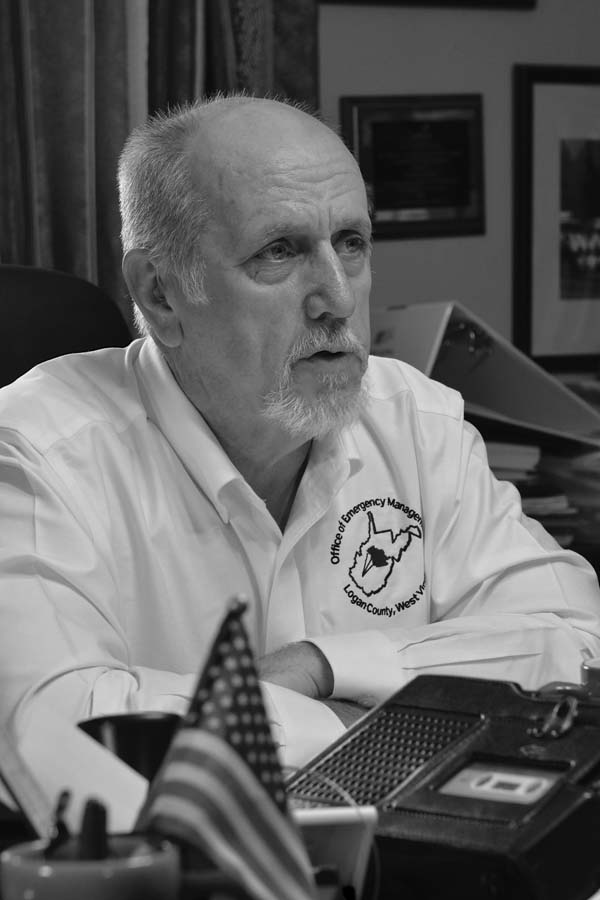Finding Balance in Logan County
A Visit with Roger Bryant
By John Lilly -Photographs by Tyler Evert

Roger Bryant at his office in Logan. Photograph by Tyler Evert. Photograph by Tyler Evert.
When disaster hit on September 11, 2001, whom did federal officials call in Logan County? It might come as a surprise to some, but they called guitar picker and songwriter Roger Bryant.
“We got the call within 10 minutes of the plane hitting the tower,” Roger says. “We didn’t know where we were going, but we were ready to go.”
Aside from his public persona as an entertainer, Roger serves as executive director of the Logan Emergency Ambulance Service Authority (LEASA) and is director of the Logan County Office of Emergency Management.
“Which means that I’m involved in emergency planning, disaster planning, [and] managing disasters such as floods,” Roger explains. “I have probably been involved in every major disaster [in Logan County] in the past 32 years.”
On that horrific day in September 2001, Roger and his crew weren’t called upon to deploy, but they routinely go wherever their skills and expertise are needed. And Roger is the fellow whom they look to for leadership, both in times of crisis and on a daily basis.
And, yes, he still plays guitar, writes songs, appears at the Vandalia Gathering and the Aunt Jennie Festival, and serves as an emcee and performer at festivals and concerts across West Virginia. Somehow, Roger, a trim and energetic individual with salt-and-pepper hair, smooth voice, and a serious expression, manages to balance his music, work, family, and recreation. But, as he tells us, this balancing act is not always an easy one.
Roger Bryant was born in Logan on September 7, 1948, the grandson of West Virginia musical icon Aunt Jennie Wilson. [See “‘I Grew Up With Music’: The Memories of Aunt Jennie Wilson,” by Robert Spence; Spring 1984.] When Roger was in his early 20’s, he spent several years traveling with his famous grandmother, eventually accompanying her on the guitar.
“My grandmother had achieved some degree of popularity, and I was chauffeuring her around,” Roger recalls. “She’d been after me, ‘Why don’t you play the guitar and play with me?’ and that sort of stuff. So my dad bought me a guitar for my birthday. A Harmony Sovereign. I still have that guitar. I believe it was my first or second year of college. My dad taught me three or four chords, and that was all I ever needed.”
The pair appeared at fairs and festivals across the state, including the Vandalia Gathering, the Mountain State Art & Craft Fair at Cedar Lakes, the West Virginia State Folk Festival at Glenville, the Appalachian Art & Craft Fair at Beckley, and at numerous 4-H heritage weekends. While at those 4-H weekends, Roger began to take a more active role in the music, playing back-up guitar to lively dance tunes and learning old-time mountain songs and traditional ballads. Other musicians attending those weekends included fiddler and banjo player Frank George, Frank’s wife Jane, and dulcimer player Russell Fluharty, all of whom helped to teach Roger what it takes to perform this style of music; they proved to be profound influences on him and his musical development.
“I learned that you can be yourself on stage, and people will accept that,” he says. “You don’t have to be somebody that you’re not. People will accept you if you are sincere and genuine.
“The second thing is – one of the things I learned from Russell – when you’re entertaining people, you don’t have to be an historian. Even though ‘Barbara Allen’ has 137 verses, you don’t have to do all 137 of them. Cut it down to something that’s going to be entertaining. Three or four verses.
“And I learned that you don’t have to go to the extreme to be entertaining.”
Roger had other influences, as well.
You can read the rest of this article in this issue of Goldenseal, available in bookstores, libraries or direct from Goldenseal.